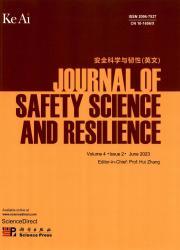国家复原力:开发和验证用于备灾评估的新的四维模型
IF 3.4
Q1 PUBLIC, ENVIRONMENTAL & OCCUPATIONAL HEALTH
引用次数: 0
摘要
本文描述的研究旨在开发并从经验上验证一个更准确和可靠的模型,用于评估国家恢复力,强调其对减少灾害风险和备灾的重要性。在以色列进行了两项大规模调查-研究1于2019年(N = 748)和研究2于2020年(N = 1198) -在COVID-19大流行的早期阶段。在探索性因子分析和验证性因子分析的基础上,编制了一份13项量表,分别对爱国主义(α = 0.860)、政治信任(α = 0.783)、感知内部威胁(α = 0.768)和感知外部威胁(α = 0.787)四个维度进行了测评。这四个因素加在一起解释了总方差的61.69%。验证性因子分析(CFA)证实,四因素结构是最佳拟合模型(GFI = 0.916; CFI = 0.867; RMSEA = 0.095),优于一因素和三因素替代模型。该模型被证明在不同的人口群体和不同的社会背景下是一致的。研究结果为评估国家复原力的社会心理维度提供了一个有效的、可扩展的工具。通过捕捉公民的情感参与、对机构的信任以及对内部和外部威胁的感知,该模型为评估一个国家的适应能力提供了一个基于证据的框架。它使政策制定者和灾害管理专家能够长期监测人口的复原力,确定社会凝聚力或机构信心方面的弱点,并制定有针对性的干预措施,以加强面对复杂和不断演变的危机的国家准备工作。本文章由计算机程序翻译,如有差异,请以英文原文为准。
National resilience: Development and validation of a new four-dimensional model for disaster preparedness assessment
The studies described here aim to develop and empirically validate a more accurate and reliable model for assessing national resilience, emphasizing its importance for disaster risk reduction and disaster preparedness. Two large-scale surveys were conducted in Israel—Study 1 in 2019 (N = 748) and Study 2 in 2020 (N = 1198)—during the early phase of the COVID-19 pandemic. Based on exploratory and confirmatory factor analyses, a 13-item scale was developed to assess four dimensions of national resilience: Patriotism (α = 0.860), Political Trust (α = 0.783), Perceived Internal Threats (α = 0.768), and Perceived External Threats (α = 0.787). Together, these four factors explained 61.69 % of the total variance. Confirmatory factor analysis (CFA) confirmed the four-factor structure as the best-fitting model (GFI = 0.916; CFI = 0.867; RMSEA = 0.095), outperforming both the one- and three-factor alternatives. The model proved to be consistent across different demographic groups and in different social contexts. The results provide a validated and scalable tool for assessing the socio-psychological dimensions of national resilience. By capturing citizens’ emotional engagement, trust in institutions, and perceptions of internal and external threats, the model provides an evidence-based framework for assessing a nation's adaptive capacity. It enables policymakers and disaster management experts to monitor the resilience of the population over time, identify weaknesses in social cohesion or institutional confidence, and develop targeted interventions to strengthen national preparedness in the face of complex and evolving crises.
求助全文
通过发布文献求助,成功后即可免费获取论文全文。
去求助
来源期刊

安全科学与韧性(英文)
Management Science and Operations Research, Safety, Risk, Reliability and Quality, Safety Research
CiteScore
8.70
自引率
0.00%
发文量
0
审稿时长
72 days
 求助内容:
求助内容: 应助结果提醒方式:
应助结果提醒方式:


